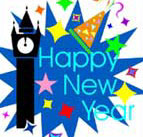
10...9...8... The lighted ball in New York's
Times Square(時代廣場)starts picking up
speed(加快速度). 7...6...5... It's almost time. 4...3...2... Everyone
holds their breath for the last few seconds. We're about to jump that
seemingly large but invisible gap that separates the years. 1...0... Happy
New Year!
We made it. The old year, for better or worse, is gone for good. The
new year has begun with fresh promise. Here's our chance to start again,
to do it right this time, to have another shot at success...at glory...at
just accomplishing what we resolve to. It's time to shed that baggage from
the year long gone and celebrate what can be in the 365 untouched days to
come. Happy New Year!
We can trace the origins of a new year's celebration back to the
ancient Egyptians and Babylonians, at least 4,000 years ago. In Egypt, the
Nile river signaled a new beginning for the farmers of the Nile as it
flooded their land and enriched it with the silt(淤泥)needed to grow crops for the next year.
This happened near the end of September.
The Babylonians held their festival in the spring, on March 23, to kick
off the next cycle of planting and harvest. Symbolically, the king was
stripped of his robes and sent away for a few days while the people whooped it up(慶祝). He then returned in all his finery(華麗的服飾)for a grand parade, and the normal
activities of life would return for the new year.
So how did we get to January 1 as the start of the year? That date was
picked by the Roman Emperor Julius Caesar when he established his own
calendar in 46 BC. The Roman Senate had actually tried to make January 1
New Year's Day in 153 BC, but it wasn't until Caesar stretched out 47 BC
for 445 days that the date we're familiar with was synchronized(同步)with the sun. We've been on the
Julian calendar ever since.
 There must be something inside of us that needs to
unload the accumulated results of fate and our own decisions and start
anew. The Romans knew this. The month of January was named for their god,
Janus, who is pictured with two heads. One looks forward, the other back,
symbolizing a break between the old and new. The Greeks paraded a baby in
a basket to represent the spirit of fertility. Christians adopted this
symbol as the birth of the baby Jesus and continued what started as a
pagan ritual. Today our New Year's symbols are a newborn baby starting the
next year and an old man winding up the last year. There must be something inside of us that needs to
unload the accumulated results of fate and our own decisions and start
anew. The Romans knew this. The month of January was named for their god,
Janus, who is pictured with two heads. One looks forward, the other back,
symbolizing a break between the old and new. The Greeks paraded a baby in
a basket to represent the spirit of fertility. Christians adopted this
symbol as the birth of the baby Jesus and continued what started as a
pagan ritual. Today our New Year's symbols are a newborn baby starting the
next year and an old man winding up the last year.
Around the world, different cultures have their own traditions for
welcoming the new year. The Japanese hang a rope of straw across the front
of their houses to keep out evil spirits and bring happiness and good
luck. They also have a good laugh as the year begins to get things started
on a lucky note.
In West Bengal, in northern India, the people like to wear pink, red,
purple and white flowers. Women favor yellow, the color of spring. Hindus(印度人)also leave shrines next to their beds so
they can see beautiful objects when they wake up to the new year.
In Vancouver, British Columbia, Canadians enjoy the traditional polar
bear swim. People of all ages don their swim suits and take the plunge, an
event that is sure to get you started in the new year with eyes wide
open.
A fairly new tradition that is starting to spread worldwide is a
community celebration of the visual and performing arts on New Year's Eve.
Started in Boston in 1976, an organization called First Night promotes
alcohol-free festivals in 186 American cities, 16 in Canada, plus
Hastings, New Zealand and Greenwich, England. Typical experiences include
ice sculptures, dancing, storytelling, theater, poetry, films and, at the
stroke of midnight, an elaborate fireworks display.
Best wishes to you and your loved ones for a happy and prosperous New
Year!
|